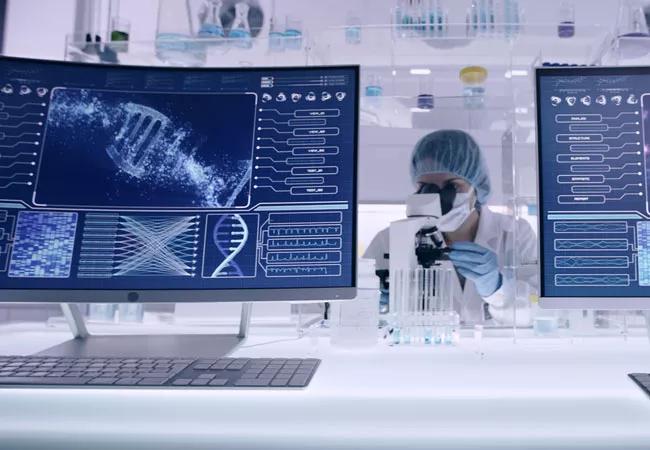Ethical considerations must include the impact on those who would carry children with modified genomes

Experts of medical ethics, policy and genetic studies underscore the ethical implications of human experiments of human germline genome editing — the process of using molecular engineering to modify germ cells to effect changes that can be generationally inherited. While the process currently is legally banned in most countries, the existence of the technology, and its potential for effecting positive and negative results, demands that a broad range of ethical considerations be made in advance.
Advertisement
Cleveland Clinic is a non-profit academic medical center. Advertising on our site helps support our mission. We do not endorse non-Cleveland Clinic products or services. Policy
In 2019, swift, negative reaction met the announcement that Chinese researcher He Jiankui had modified the CCR5 gene in two embryos. The experiment sent shockwaves through the global medical community. Since then, no similar gene editing experiments are known to have been conducted, and it is unclear how the babies and their mothers have fared.
Members of the ethics and scientific communities have speculated about acceptable uses of Clustered Regularly Interspaced Short Palindromic Repeats (CRISPR) genome editing technology. To date, the health and wellbeing of children born from CRISPR have been the focus of debate about the use of this technology in germline genome editing. While they are an important group to consider, they are not the only ones who may be affected by this research.
There has been little effort to examine the impact on study participants who may be willing to carry a genomically modified human embryo, but this is important population must be apprised of the potential risks and benefits of such research.
A new commentary by Cleveland Clinic and Case Western Reserve University researchers aims to fill that gap by providing perspective on the potential implications of a theoretical first-in-human clinical protocol for genomic modification of a human embryo. Published in Accountability in Research, the analysis is designed to serve as a resource for Institutional Review Boards (IRBs) that may be called upon to assess the ethical and scientific frameworks of such research.
Advertisement
“It occurred to us that the focus of discussion in the scientific, policy and ethics space has been on the children whose genomes were modified as embryos but not a lot of questioning about the risks to the woman who carried them,” says Ruth M. Farrell, MD, MA, Vice Chair of Research for the Women’s Health Institute and first author of the piece.
Dr. Farrell and colleague Marsha Michie, PhD, Assistant Professor in the Department of Bioethics at Case Western Reserve University, have received a three-year, $1.77 million National Institutes of Health grant to further examine the topic.
“We see our commentary serving in a proactive role, bringing attention to pregnant persons in studies of human genomic modification. That way, we can help prepare scientists, policy makers and IRBs for the challenges that will come if and when this research moves forward,” Dr. Farrell says. “Our work is not an endorsement of human genome editing, nor is it in preparation for any such experiments. It is a way to draw attention forward to what science can accomplish and what we should have in place in conjunction with those advances. We want to be anticipatory and encourage thought leaders, scientists, clinicians and policymakers to consider what safeguards should be in place.”
The authors underscore the importance of women and families as stakeholders in use of genomic technology and express concern about potential harm to them if research moves forward too rapidly. They view IRBs as holding one of the keys to creating a research path that is ethically and scientifically responsible.
Advertisement
“Our IRBs play a key role in ensuring protections of human subjects who may participate in trials of human genome editing,” Dr. Farrell says. “Yet, they are not the only the resource to ensure that safeguards are in place with this type of research. It is also funding organizations, research organizations and policy makers.
The researchers plan to add their recommendations for IRBs in the context of the theoretical cases for use of germline editing put forth previously by the National Academies of Science, Engineering and Medicine (NASEM). Those recommendations include what risks should be considered for the pregnant woman and offspring. While the focus of protections often lie in the informed consent process, the outcomes, SAEs, and other methodological considerations also affect what risks study participants may be exposed to by their participation.
Were an IRB to review such a protocol, considerations must include the risks to the maternal-fetal dyad during pregnancy and in the months and years after delivery.
“When we think about studies that involve human embryo modification, we have to include in the discussion not just the offspring born from these studies, but also the women who will become pregnant with these embryos and their families,” says Dr. Farrell. “Their interests need to be prioritized because we have an ethical obligation to minimize risk for all study participants.”
In concluding their commentary, the authors recommend that IRBs take a broad view of human genome editing. They suggest that panels reviewing future protocols include experts in behavioral research, reproductive health, human genome editing, and select members of the public so that psychological, relational and social implications of the technology can be explored.
Advertisement
Advertisement

In rehabilitation medicine, the answer might require nuance

Mental health colleagues can provide much-needed perspective

Palliative care specialists know hard conversations can also be valuable ones

Variables affect nuances of the conversation

Authors discuss ethical challenges associated with sponsored genetic testing

Program focuses on nurturing ethics leaders in daily practice

Medical, ethical and legal considerations

An end-of-life dilemma in the intensive care unit